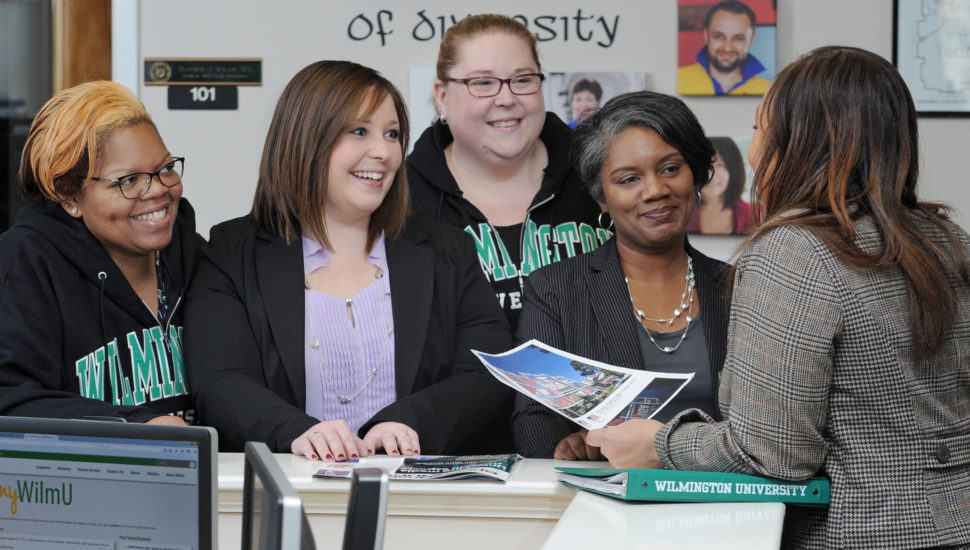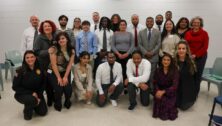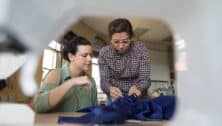Olympic Quest: Four WilmU Grad Students Get Taste of What It Takes to Produce World-Class Athletes

 By Bob Yearick
By Bob Yearick
Calling it “a childhood dream,” Manon Neal just had to do it – she couldn’t help herself.
She got a running start, then did a cartwheel – on the very mat where U.S. Olympic gymnasts train!
“I was achy the next day, but it was so worth it,” she said. “That was the closest I will come to fulfilling any Olympic aspirations.”
The cartwheel was just one of the many highlights for Neal and three other Wilmington University graduate students who accompanied Dr. Janice Wardle, chair of the Sports Management undergraduate degree program, to the Olympic Training Center in Colorado Springs last October. They spent five days participating in The TEAM USA Experience, which was developed by the OTC in partnership with various colleges and universities.
All four students are enrolled in WilmU’s Master of Science Management program. Besides Neal, who is studying for her MSM in Organizational Leadership, the group included Stephanie Moore (Human Resources), Nichelle Scott (Healthcare Administration), and Hillary Sinclair (Organizational Leadership).
They used the experience and case study as a part of their thesis for MGT 8800 Integrative Independent Study Project, a three-credit course that combines theory and practice executed through a research methodology for the application of knowledge and skills that were acquired in regular course work.
Said Dr. Sheryl Scanlon, chair of the MSM program: “The course enables students to utilize this hands-on approach to solving a real-world situation as their thesis research project.”
For Neal, Moore, Scott, and Sinclair, that meant a two-fold task: developing a campaign to motivate 1 million individuals to donate $100 each by 2020 to the United States Olympic and Paralympic Foundation, and engaging 350 million people via social media to Team USA 2020.
The U.S. government does not fund the games, so persuading private citizens to contribute to the Olympic effort is critical, said Dr. Wardle. “Thirty to 40 percent of funding comes from corporate sponsors or organizations, but the remaining support must come from individuals.”
To get the students fired up for the project, their hosts immersed them in the Olympic training experience. The week started with a tour of the 40-acre campus, including the swimming, boxing and gymnastics facilities. Sessions and presentations from Olympic officials began at 8:30 in the morning and ended around 3 in the afternoon. What’s more, the group got to stay in the athletes’ dorms and eat in their dining halls.
“It’s all fresh food, and almost customized to your individual needs,” said Dr. Wardle of the OTC menu.
They also observed some of the athletes training, and heard from current and former Olympians about the challenges of competing at a world-class level in their sports. As a result, the WilmU students gained a deep respect, bordering on awe, for not only the athletes but everyone associated with the Olympic program. They got an insider’s sense for the extensive skills and professional diversity that’s required for a successful Olympic program.
“What I learned from this experience is that there are so many educational opportunities out there beyond what you may think,” said Scott, whose employer, Green Clinics Laboratory of Dover, helped fund her trip. “I would have never thought there were so many careers involved in operating an Olympic Training Center. We spoke to individuals from transportation to nutrition. It was so fascinating to know that these careers and more are needed for this facility.”
The group also gained an understanding of the high standards that must be met by everyone at the OTC. “The people were absolutely amazing,” said Moore, who admits she wanted to, but didn’t, “jump around on the mat like Manon.” “They filled our heads with knowledge that we never would had gotten if we didn’t go out there and do this.”
The entire OTC, of course, is focused on the athletes, whose challenges are the most demanding. “Becoming an Olympian requires years of sacrifice,” said Dr. Wardle, “and because of the time they must spend training, they often don’t have time for full-time jobs. We learned that the average Olympian makes less than $20,000 a year.”
Sarah Hammer, a four-time silver medalist in cycling, was among the athletes who spoke to the group. The 34-year-old Californian explained that Olympic athletes must pay for their own training unless they’re funded by an organization, and that rarely happens unless the athlete is an almost-guaranteed medal winner. She told the group that she held down three jobs to cover her training expenses.
The interaction with Hammer was another highlight of the trip. Said Scott: “To be able to hold one of her medals was priceless.”
The group had been given the topic for their thesis in the summer, so they had already completed extensive research prior to arriving in Colorado Springs. But every day, the sessions with Olympic officials and athletes altered the students’ approach to their project. “Everyone would go back to their rooms at night and make changes to their proposals,” said Dr. Wardle. “It was a very dynamic experience.”
On their last day, the students made two power point presentations to the Olympic officials in which they detailed their recommendations. Perhaps the most significant proposal was to increase the postings on the website to make it more of an influencer. Apparently, the committee has picked up on this suggestion. “Before (our visit), they were posting every two or three days,” said Dr. Wardle. “Now, the postings are daily.”
Another suggestion was to make it possible for visitors to the site to identify current Olympians who live in the visitor’s state or Zip code. Another idea that seemed to generate enthusiasm was “20 for 20”: Encourage Americans to donate $20 for 20 months leading up to the 2020 Summer Olympics in Japan.
As yet, the recommendations have not been officially adopted, but if they are, the university will receive credit.
The trip left each member of the WilmU group with her own unique impressions. “I now feel a more personal connection to the events I commonly see on TV, such as men’s gymnastics, wrestling, and judo,” said Sinclair.
Scott, who is a mother of five, admits she’s “not an athletic person,” but she does like boxing. “My oldest son is training to become a professional boxer and being able to relate to the boxing foundation speaker and some of the inspirational stories of the athletes’ struggles really resonated with me.”
Dr. Wardle extended this opportunity to other MSM students, not just those in the Sports Management program, and Neal is grateful. “I feel she provided us with a valuable educational experience,” she said. “I was excited that my research could possibly benefit Team USA and I look forward to having an invaluable real-world experience to put on my resume. In the end, I feel the experience not only provided me with these things, but also, unexpectedly, I left the OTC feeling that my small contribution made me a part of something so big. Now, when I watch the Olympics and Paralympic Games, I’ll have a greater regard and a sense of connectedness with Team USA.”
Neal also praises Dr. Wardle’s mentoring skills. “I appreciated her insight, support and guidance during the preparation of our case study and our presentations. And, she was a great travel partner!”
Moore said the trip made her thesis “rewarding,” and she recognizes that it was a unique experience. “In my undergrad, I wasn’t able to do anything like study abroad or go on any trips,” she said. “When this opportunity arose in my master’s, I knew I had to jump at it. And knowing that I was able to directly affect how funds are raised for the foundation is something I can sure say I am very proud of.”
What’s more, said Dr. Wardle, “The project fit perfectly into the Wilmington University model, which is practitioner based – trying to bring real-world experience into the classroom.” And while other universities have been invited to visit the OTC, “we are the first to incorporate it into our thesis work.”
The once-in-a-lifetime experience may become available to other WilmU students. Dr. Wardle reports that the Olympic committee has invited the University to send another group this fall, perhaps during Reading Week.
As for this year’s group, Stephanie Moore probably sums it up best: “This trip will be something I’ll talk about for years, and I will be grateful forever.”
Click here to learn more about Wilmington University.
[uam_ad id=”80503″]
.
[uam_ad id=”80503″]
Connect With Your Community
Subscribe to stay informed!
"*" indicates required fields











































![95000-1023_ACJ_BannerAd[1]](https://vista.today/wp-content/uploads/2023/03/95000-1023_ACJ_BannerAd1.jpg)







